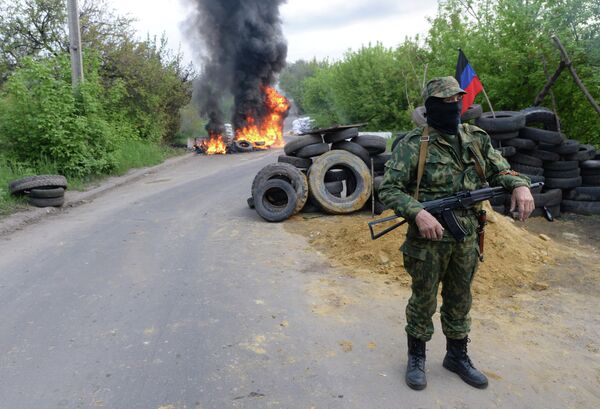MOSCOW, May 5 (RIA Novosti) – Deadly clashes between pro-federalization supporters and Ukrainian security forces have raged across the country’s east and south in recent days, killing dozens and injuring hundreds.
Some 46 pro-federalization activists died after being trapped in a fire at the trade union building in Odessa, and over 200 others were injured in a clash between the “anti-Maidan” and “euro-Maidan” supporters in the Black Sea port on Friday. The skirmishes were the bloodiest episode of violence in Ukraine since the start of the crisis in February.
Ukrainian acting Prime Minister Arseny Yatsenyuk, appointed by the country’s parliament, has claimed Russia initiated the conflict. He accused the local police of inaction and launched an investigation to find the organizers.
On Sunday, pro-federalization activists stormed the city’s police station and freed 67 fellow protesters detained during the clash.
The killings in the mainly Russian-speaking Odessa followed a series of protests in the eastern region of Donbass. Violence has been escalating since Kiev launched special operations involving Ukrainian militants in the cities of Donetsk, Kramatorsk, Slaviansk and Lugansk.
In Donetsk, where pro-federalization protesters have been fighting for greater regional autonomy since February, about 1,000 armed men marched the city streets on Sunday, chanting they would not forgive the crimes committed in Odessa.
The press service of the Donetsk People’s Republic said Sunday the Mayor Alexander Lukyanchenko had resigned and passed the keys to pro-federalisation activists the same day, but denied the statement on Monday.
Reports of gun shots from another federalist stronghold in eastern Ukraine, Slaviansk, followed the launch of a special operation against nationalists on Friday, resulting in two Ukrainian helicopters being shot down, their pilots killed and a third taken hostage.
Slaviansk remains surrounded by roadblocks as federalization supporters expect an attack following the departure of OSCE observers, who were detained by nationalists for a week before being freed Saturday.
Kiev’s special operation involving dozens of helicopters was also launched in Kramatorsk. A battle on Saturday night left one city defender dead and nine others wounded.
In Lugansk, people's mayor Valery Bolotov announced the state of emergency pointing out the increased Ukrainian military presence in the region and the punitive operations launched by Kiev.
The US has promised assistance to Ukrainian troops, while reports accuse CIA and FBI agents of advising Kiev. Dozens of US Federal Bureau of Investigation and Central Intelligence Agency staff have been consulting with Ukrainian interim authorities according to a report in the Sunday edition of the Bild newspaper, citing unnamed sources in German law enforcement.
American special agents are involved in the operations in Ukraine’s southeast, building effective military forces as assigned by the US authorities and resolving financial crimes, including searches for the funds of the ousted president.
Russian Foreign Minister Sergei Lavrov said earlier the recent visits of US Vice President Joseph Biden and CIA chief John Brennan to Kiev followed by the restart of a military operation against protesters in the southeast of the country is evidence that the US is controlling the actions of Ukrainian authorities.
US Senator John McCain announced late on Sunday the Senate was preparing a law allowing Russia’s Cold War opponent to help Ukraine militarily, according to Ukrainian online news portal Ukrainska Pravda. So far, the US intends to send Ukrainian troops a $100-million dollar financial aid package, but McCain said he was persuading US President Barack Obama to send military help as well.
Russian President Vladimir Putin has received permission from the upper house of parliament to send military troops to Ukraine, but so far, has declined to use the power.
As Ukraine prepares for presidential elections on May 25, Russian deputy foreign minister Grigory Karasin has called on all sides of the conflict to cease violence and begin talks on the resolution of the conflict. The crisis arose from reactions to the violent protest movement in February that led to the overthrow of President Viktor Yanukovych and the reunification of Crimea with Russia.
Karasin urged the parties to follow the Geneva agreement signed two weeks ago, calling for both sides to end violence, extremism and provocations, disarm illegal armed groups, free seized buildings and begin a national dialogue on constitutional reform.


